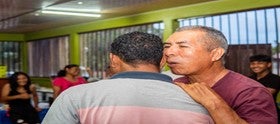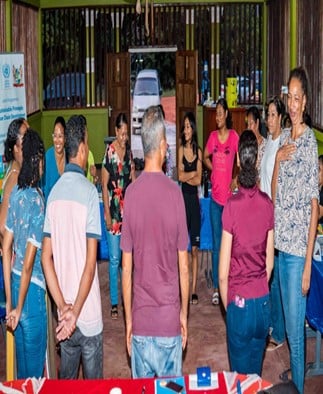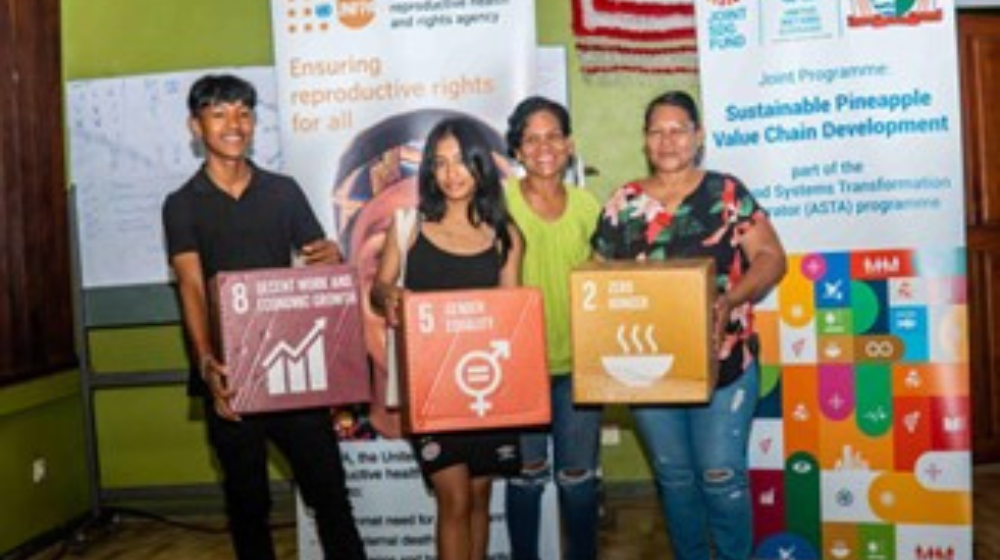On International Women’s Day, Mar 8, 2024 The Leadership training, part of the series of the Gender Capacity Building trajectory of UNFPA, was held in Pierre Kondre in district Para. This series of training is a part of the Joint Programme Agrifood Systems Transformation Accelerator” (ASTA) “ Sustainable Pineapple Value Chain Development’’; which is a four-year project run by Food and Agriculture Organization (FAO), Nations Industrial Development Organization United (UNIDO), the International Labour Organization (ILO) and the United Nations Population Fund (UNFPA). The ambition of this Joint Programme is to accelerate the supply of pineapple fruit and pineapple products and create new jobs that will positively impact rural livelihoods. The jobs will span from production and processing to trading, inputs supply and support services delivery, with women and young people standing to benefit the most.
In this enlightening and participatory Leadership training, UNFPA aimed at promoting gender equality and enhancing leadership roles in society. This initiative drew participation, especially from women, signifying an empowering move towards societal balance and understanding.

The session, spanning from the hours of 5:00 PM to 8:00 PM, extended beyond its scheduled time frame, underscoring the enthusiasm and engagement of the participants. The event was ideally structured to blend theoretical knowledge with interactive activities, ensuring that the concepts of gender equality and leadership were not only understood but also felt and practiced.
One of the key activities was a cognitive game designed to sharpen the attendees’ attention to detail and gain keen listening skills. Resembling the classic game ‘Simon Says’, this exercise emphasized the importance of awareness and precision in communication — qualities essential for effective leadership and gender-sensitive governance.
Further advancing the workshop’s interactive dimension, participants were divided into groups, each led by a designated chairman and secretary. This structure was not static; roles rotated after every two or three assignments, allowing each member to experience leadership positions and administrative responsibilities. This hands-on approach facilitated a deeper understanding of leadership dynamics and fostered teamwork and respect among the members.
An innovative exercise involved the groups drawing representations of their ideal leader, highlighting the desired leadership qualities. This activity not only encouraged creativity but also initiated discussions on the various perceptions of effective leadership, challenging traditional gender norms and expectations.
The program also included a ‘whispering game’, played in a circle, which served as a metaphor for the challenges and miscommunications that can arise within a team or organization. The success in this game illustrated the participants’ improving communication skills and their ability to collaborate effectively.

The session culminated with an interesting discussion on leadership qualities and the dynamics of communication within a group. This part of the training underscored the fine line between modesty & invisibility and between confidence & arrogance, offering valuable insights into the balance required to being an ideal leader.
Participants were also treated to a well-deserved break, with snacks and drinks provided, fostering a relaxed atmosphere, conducive to networking and informal learning.
In conclusion, UNFPA’s gender training in Para was not just an educational event; it was a transformative experience that empowered the people of Pierre Kondre and enriched their understanding of gender equality and leadership. By engaging in thought provoking activities and discussions, the participants left with not only enhanced skills and information on the topic but also a renewed sense of purpose and commitment to fostering equality and leadership in their community.


